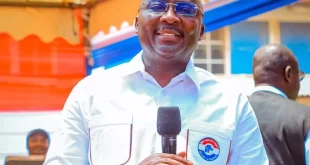The President of the Republic, Nana Addo Dankwa Akufo-Addo, has urged all interested parties to work together to create a new Ghanaian civilisation where the rule of law is not only a catchphrase but rather a guiding principle for the nation’s growth.
According to the President, “all of us, from the executive, legislature, judiciary, public sector, security agencies, private sector, political parties, civil society, professional and trade associations, religious bodies, traditional authorities and ordinary citizens have a collective responsibility to work together with our different views and our different perspectives for the Ghana project.”
“A united Ghana driven by considerations of social justice and solidarity governed according to the rule of law, respect for individual liberties, human rights, and the principles of democratic accountability,” he said.
This was said by President Akufo-Addo when he swore Justices Barbara Frances Ackah-Yensu and Samuel Kwame Adibu Asiedu into their positions as Justices of the Supreme Court in compliance with the strict requirements of Article 144 Clause 2 of the Ghanaian Constitution.
The President stated that “rigorous nomination and confirmation processes established by the Judicial Council and undertaken in cooperation with the Council of State with the agreement of Parliament” preceded the Justices’ swearing-in.
Expressing confidence in the nominees, he said, “the Post 1966 Supreme Court has developed a positive reputation for the quality of its constitutional jurisprudence, and I am hopeful that you who have already given good accounts of yourselves in high judicial office in the court of appeal will help strengthen the development of our nation’s constitutional and other jurisprudence in the Supreme Court.”
Continuing, he noted that “the Judiciary has exclusive jurisdiction, in all matters of the application of the law, civil and criminal, including matters relating to the interpretation and enforcement of the constitution. It has thus onerous responsibilities, to protect individual liberties and fundamental human rights of citizens to act as the arbiter in disputes between the state and the citizens, to act as the arbiter in disputes between the citizens and all persons. And to serve as the bulwark of the defense and promotion of the liberties and rights of our people.”
“Central to the execution of these functions, is the Supreme Court. As expressed in Article 129, the Supreme Court, our nation’s court of last resort, is not bound to follow decisions of any other court including its own and shall have all the powers, authority and jurisdiction vested in any court established by the constitution or any other law,” the President added.
Still on the jurisdiction of the Supreme Court, he stated further that, “with all other courts bound to follow the decisions of the Supreme Court on questions of law, it is obviously critical that Justices of the Supreme Court, possess a sound knowledge of the law and of precedence, the principle of Stare Decisis, which has been the bedrock for the evolution of the common law.
Therefore, “since Article 129, positions the Supreme Court as the policy court, where far-reaching decisions on our socio-economic development are fashioned in response to the exigencies of the time, perspectives of its judges are thus critical for our national development especially in these challenging times.”
Source: Ghanatodayonline.com
 Ghanatodayonline.com News, Politics, Health, Education & More
Ghanatodayonline.com News, Politics, Health, Education & More




